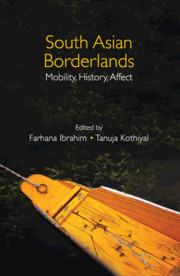Book contents
- Frontmatter
- Contents
- List of Figures and Tables
- Acknowledgements
- Introduction
- 1 Paradise at the Frontier: Kashmir as a Political Terrain and Literary Landscape in the Mughal Empire
- 2 Borders in the Age of Empire and Nation-States: The Honeycomb of Borderlands: Kumaun, Western Tibet and Far Western Nepal
- 3 Borders, Difference, Recognition: On the Cause(s) of Gorkhaland
- 4 Embattled Frontiers and Emerging Spaces: Transformation of the Tawang Border
- 5 Relative Intimacies: Belonging and Difference in Transnational Families across the Bengal Borderland
- 6 Reading Parijat in Nepal: The Poetics of Radical Feminism Negotiating Self and Nation
- 7 Commodity Journeys and Market Circuits: Making Borders ‘Natural’ in Colonial Western Himalayas
- 8 Frontiers, State and Banditry in the Thar Desert in the Nineteenth Century
- 9 Bureaucracy and Border Control: Ethnographic Perspectives on Crime, Police Reform and ‘National Security’ in Kutch, 1948–52
- 10 Frontier as Resource: Law, Crime and Sovereignty on the Margins of Empire
- About the Contributors
- Index
1 - Paradise at the Frontier: Kashmir as a Political Terrain and Literary Landscape in the Mughal Empire
Published online by Cambridge University Press: 17 September 2021
- Frontmatter
- Contents
- List of Figures and Tables
- Acknowledgements
- Introduction
- 1 Paradise at the Frontier: Kashmir as a Political Terrain and Literary Landscape in the Mughal Empire
- 2 Borders in the Age of Empire and Nation-States: The Honeycomb of Borderlands: Kumaun, Western Tibet and Far Western Nepal
- 3 Borders, Difference, Recognition: On the Cause(s) of Gorkhaland
- 4 Embattled Frontiers and Emerging Spaces: Transformation of the Tawang Border
- 5 Relative Intimacies: Belonging and Difference in Transnational Families across the Bengal Borderland
- 6 Reading Parijat in Nepal: The Poetics of Radical Feminism Negotiating Self and Nation
- 7 Commodity Journeys and Market Circuits: Making Borders ‘Natural’ in Colonial Western Himalayas
- 8 Frontiers, State and Banditry in the Thar Desert in the Nineteenth Century
- 9 Bureaucracy and Border Control: Ethnographic Perspectives on Crime, Police Reform and ‘National Security’ in Kutch, 1948–52
- 10 Frontier as Resource: Law, Crime and Sovereignty on the Margins of Empire
- About the Contributors
- Index
Summary
For the inhabitants of the Mughal milieu, Kashmir was an evocative word. In the literature of the court—poetry, travel accounts and chronicles—it was described as Kashmir jannat nazir (Kashmir that is paradise-like) and suba i dil pazir (a province close to the heart). However, there is a duality to Kashmir's landscape. This valley in the western Himalayas nestles behind a high wall of mountains. While the paradisiacal region beckoned emperors and poets, it could only be reached by negotiating difficult roads up high mountains and through narrow passes. The journey to Kashmir, Mughal writings proclaimed in horror, was torturous and perilous. The representations of Kashmir as a difficult to access paradisiacal space made its landscape the focus of the courtly imagination.
The relationship between the Mughal state and Kashmir was framed by its geographical position at the territorial margins of the empire as well as by its topographical characteristics. With its conquest in 1586, Kashmir became the northern political frontier of the Mughal Empire. It became a part of the Mughal court's Central Asian aspirations. Unlike the north-western or southern parts of the empire, Kashmir as a frontier was neither porous nor mobile. Over time, with repeated royal sojourns in the region, it became a destination, a place where journeys came to an end. At the same time, continuing political challenges to Mughal authority from within the region over the sixteenth and seventeenth centuries made Kashmir a site of anxiety for the Mughal Empire. This characteristic of tenuous political control, I would argue, marked it as a borderland, but one that was internal to the empire.
In this chapter, I examine the representations of Kashmir in the textual productions of the Mughal court. Over the sixteenth and seventeenth centuries, a corpus of texts—chronicles, travel accounts, epistles and administrative documents—described and discussed the region. Contiguously, from the late sixteenth century, its landscape became the subject of literary compositions (S. Sharma 2017). The concept of Kashmir jannat nazir emerged as a literary imaginary in the poetry of the late sixteenth century and evolved over the seventeenth century. I argue that what appears as a description of an extraordinary landscape was a discourse of political authority about a borderland region of the Mughal Empire. Over the sixteenth and seventeenth centuries, Kashmir moved from being an uncharted borderland to a province cognisable within the imperial ecumene.
- Type
- Chapter
- Information
- South Asian BorderlandsMobility, History, Affect, pp. 21 - 43Publisher: Cambridge University PressPrint publication year: 2021



